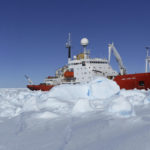Continuous Plankton Recorder
Continuous Plankton Recorder
- Start date
- 6 April, 2005
- End date
- 31 December, 2016
Contemporary research has shown that the Southern Ocean is warming. Summer surface temperatures have risen by more than 1 degree Centigrade in the last 80 years and a strong upper-layer salinification has taken place. Against this background it has become increasingly important that we are able to understand how the oceans, and in particular plankton at the base of the food chain, will respond to future change. Marine species in this region are very sensitive to change and population and species removal have been predicted in response to very small increases in ocean temperature.
However, to date, as elsewhere in the world, links between plankton and climate have been difficult to observe in the Southern Ocean due to the relatively short duration of plankton collections and the lack of concomitant oceanographic data from earlier eras. Where extensive time-series do exist, as in the North Atlantic and Pacific, strong evidence has emerged for changes in plankton abundance and community structure. Studies to date have emphasized the sensitivity of plankton communities to climatic signals as reflected in atmospheric models such as the NAO and ENSO. In the Southern Ocean links between ENSO, ocean temperature and marine biology have been reported, with squid stock recruitment, breeding performance and population sizes of seabirds and seals and population dynamics of Antarctic krill being amongst the ecosystem indicators influenced.
To try to remedy the lack of long time-series plankton data, British Antarctic Survey, in partnership with the Sir Alister Hardy Foundation for Ocean Science (SAHFOS), followed the Australian Antarctic Division into CPR research in the Southern Ocean. Following a proof of concept tow in 2005 we carried out up to 6 tows during the ensuing Antarctic summer seasons from RRS James Clark Ross, bounding the perimeter of the Scotia Sea. An opportunity to consolidate research along one route presently run between Stanley in the Falkland Islands and South Georgia by Pharos SG, the islands fisheries protection vessel, was taken in 2010. Field support for the CPR was provided by the South Georgia Fisheries support staff. The samples were preserved and returned via BAS at the end of each Antarctic season, from where they were forwarded to SAHFOS for analysis. Data from these surveys are lodged with BAS, SAHFOS and the SO-CPR database in Hobart.
